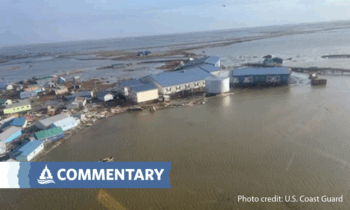 Last week, the remnants of a Pacific typhoon hit the west coast of Alaska with devastating results. Former Typhoon Halong brought hellacious winds and a coastal surge several feet above the highest tides ever recorded.
Last week, the remnants of a Pacific typhoon hit the west coast of Alaska with devastating results. Former Typhoon Halong brought hellacious winds and a coastal surge several feet above the highest tides ever recorded.
The storm broadsided two Native villages, washing more than 150 homes, some with people still inside, out to sea, forcing one of the largest air evacuations in the state’s history.
Unfortunately, even the magnitude of this disaster will likely not change the current direction of national or even state policies. Governor Mike Dunleavy, a climate denier, called the ravages from Halong “an act of God” with no acknowledgement of human fingerprints. However, the severity of even this downgraded typhoon was fueled by a huge marine heatwave now stretching across the North Pacific, fueled in large part by rising temperatures associated with human-induced climate change.
Due to its northern latitude and seasonal changes in sea ice, Alaska has been warming twice as quickly as the global average since the middle of the 20th century and is warming faster than any other state.
Authorities have known for years that scores of other rural communities in Alaska face significant threats from flooding, erosion and/or thawing permafrost, yet have done little to prepare for or avoid these impacts. For example, back in 2007, then-Governor Sarah Palin created an Alaska Climate Change Sub-Cabinet to work on implementing a strategic plan for the state. Three years later, the Sub-Cabinet was abandoned and has not reconvened in the intervening years.
Nor is the state making any provision for paying the massive costs of relocating thousands of coastal residents who will face similar catastrophes. Despite soaring costs, the state has resisted repeated efforts to establish an Alaska Climate Resilience Fund to help communities harden their infrastructure.
Nor can Alaska count on federal assistance. Federal climate-related funding is shrinking, with a $20 million Environmental Protection Agency (EPA) grant for one of the stricken villages recently retracted. Even emergency disaster relief payments from FEMA are in doubt.
Meanwhile, Alaska is investing in greater fossil fuel development with full support of the Trump administration. The resulting emissions will drive even higher global temperatures, aggravating the infrastructure in ways Alaska just witnessed.
Sadly, it appears that this latest tragedy will not stimulate any official actions to prevent or mitigate a repeat of the havoc which will predictably follow. Even as the horrendous human, environmental, and economic toll of climate change mounts, Alaska’s leaders remain determined to keep their heads buried in the melting permafrost.
 Jeff Ruch is the former Executive Director and Pacific Director of PEER. He now serves as Senior Counsel.
Jeff Ruch is the former Executive Director and Pacific Director of PEER. He now serves as Senior Counsel.